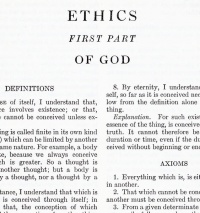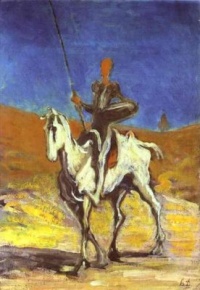17th century in literature
From The Art and Popular Culture Encyclopedia

|
Related e |
|
Featured: |
- baroque literature, early modern literature
- Don Quixote (1605) - Simplicissimus (1668) - Letters of a Portuguese Nun (1669) - La Princesse de Clèves (1678), Sodom, or the Quintessence of Debauchery (1684)
The invention of movable type printing subjected both novels and romances to a first wave of trivialisation and commercialisation. Printed books were expensive, yet something people would buy, just as people still buy expensive things they can barely afford. Alphabetisation, or the rise of literacy, was a slow process when it came to writing skills, but was faster as far as reading skills were concerned. The Protestant Reformation afforded readers of religious pamphlets, newspapers and broadsheets.
Notable and bestselling genres of the time are the picaresque novel, baroque comic fiction and the works of Cervantes. Although written in the previous century, Brantome's Les Vies, published in the middle of the century set a trend for the emergence of a European market for scandal.
Contents |
Notable writers
Spain
- Pedro Calderón de la Barca, Spanish dramatist (1600 – 1681)
- Miguel de Cervantes Saavedra, Spanish author (1574 – 1616)
- Francisco de Quevedo, Spanish writer (1580 – 1645)
- Félix Lope de Vega, Spanish playwright and poet (1562 – 1635)
France
- Pierre Corneille, French dramatist (1606 – 1684)
- Nicolas Boileau-Despréaux, French poet and critic (1636 – 1711)
- Jean de La Fontaine, French poet (1621 – 1695)
- Molière, French dramatist, actor, director (1622 – 1673)
- Jean Racine, French dramatist (1639 – 1699)
England
- William Shakespeare, English author and poet (1564 – 1616)
- Daniel Defoe, English writer, novelist (1659 or 1661 – 1731)
- John Wilmot, 2nd Earl of Rochester, English poet (1647 – 1680)
- John Donne, English metaphysical poet (1572 – 1631)
- John Dryden, English poet, literary critic, translator, and playwright (1631 – 1700)
- Ben Jonson, English dramatist c.1572 – 1637)
- John Milton, English author and poet (1608 – 1674)
- Samuel Pepys, English civil servant and diarist (1633 – 1703)
Germany
- Andreas Gryphius, German poet and dramatist (1616 – 1664)
China
- Miyamoto Musashi, famous Samurai warrior in Japan, author of 'The Book of Five Rings,' a treatise on strategy and martial combat, poet, painter, (1584 – 1645)
Events and trends
- 1660-1669 - Samuel Pepys writes his diary.
- 1667-1668 - Marianna Alcoforado writes her Letters of a Portuguese Nun.
- Metaphysical poets
- German literature of the Baroque period
See also
- list of literary births and deaths in the 17th century
- list of new books and plays published in the 17th century


